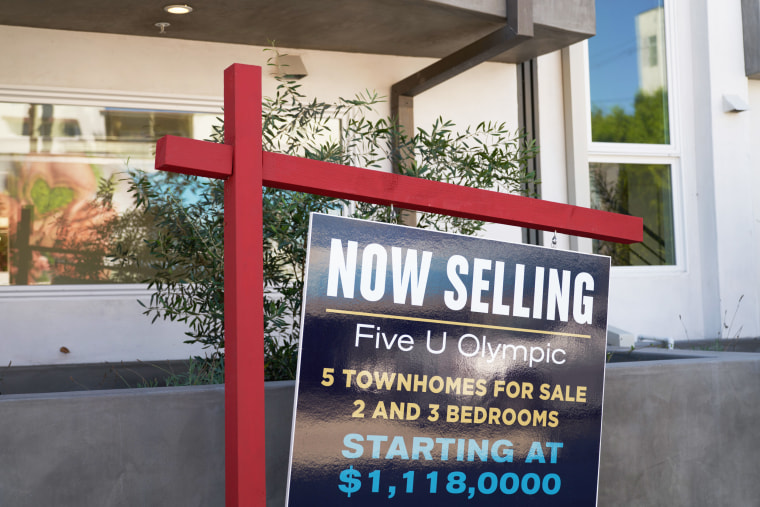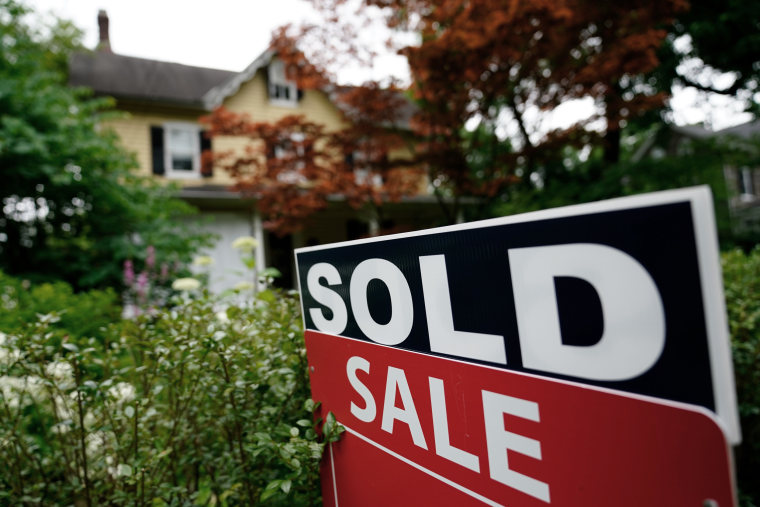WASHINGTON — Home buyers feeling financially squeezed by higher interest rates are increasingly being steered by real estate agents and mortgage brokers to potentially riskier types of mortgages, similar to those seen ahead of the 2008 financial crisis, causing concern among some consumer advocates and industry analysts.
Among the loans being promoted to home buyers are adjustable rate mortgages, so-called 2-1 buydowns, which artificially lower rates for the first two years, and interest-only mortgages in which borrowers pay a lower monthly payment for several years by only paying the loan interest, according to interviews with real estate professionals, industry data and a review of marketing material from real estate agents and mortgage brokers.
In all instances, borrowers can find themselves with monthly payments that increase by hundreds of dollars a month after the introductory period, a dynamic seen in the run-up to the last housing market crash when predatory lending resulted in millions of borrowers losing their homes, and forcing some major financial institutions out of business.
Industry experts say they don't expect the U.S. to see a repeat of the last mortgage crisis because of regulations put in place since then, and the higher standards as to who qualifies for a mortgage. They also note that adjustable rate mortgages and other atypical home loans make up a much smaller percentage of total mortgages than what was seen during the 2008 crash.
But consumer advocates and others close to the real estate industry warn that homebuyers could still find themselves in a precarious financial position when their mortgage interest rates reset and they find their monthly payments going up.
“We are watching anxiously as we see more interest in these alternative mortgage products that often seem to involve some sort of initial teaser interest rate and the interest rate is going to go up,” said Sarah Mancini, a staff attorney with the National Consumer Law Center. “The scary thing about this market is that people are trying to stretch to get in the door and that can put individuals in a very difficult spot."
Mancini and other consumer advocates say the trend toward riskier mortgages is particularly concerning given the overall uncertainty in the economy as economists and business leaders project unemployment will rise, interest rates will continue going up, and housing sales will decline. Those dynamics could mean more people are out of a job and unable to refinance their homes at a lower rate or sell if needed.
“You can get behind the eight ball if rates start rising and your wages don’t and that’s really the disconnect here,” said Barry Zingas, who is a senior fellow at the Consumer Federation of America and was senior vice president for community lending at Fannie Mae from 1995 to 2006. “I would caution consumers to always plan for the worst, hope for the best. But often in these circumstances, people find themselves planning and hoping for the best, which is not a good recipe for success.”
Rates for a standard 30-year fixed-rate mortgage have doubled since the start of the year, meaning a monthly payment on a $400,000 mortgage now costs $865 more a month than it did in January.
Home prices have begun to decline, and the trend is expected to continue, though prices should remain well above their pre-pandemic levels through 2023, according to estimates by the investment bank Goldman Sachs and ratings agency Fitch.
Nick Holeman, director of financial planning at Betterment, a robo- advisor, said he has been hearing a growing sense of urgency from clients about moving quickly to buy a house. As they see rates rise, more of them have been asking about alternatives to the 30-year fixed-rate mortgage.
“Now, they are feeling like, 'Oh, God, higher interest rates are coming, we want to jump on it, we don’t want to miss it again,'" said Holeman. "I’m feeling more and more of the urgency as opposed to people sitting on the sidelines to see what happens with prices."

As rates have risen, so have the number of adjustable rate mortgages, which can lower the interest rate by 1 to 2 percentage points, shaving hundreds of dollars off of the monthly payment, before resetting to the market rate after 3 to 10 years. Those mortgages now account for nearly 12% of all mortgages, up from around 3% a year ago, according to data from the Mortgage Bankers Association.
Still, that is a much smaller share than during the lead-up to the financial crisis when they accounted for nearly a third of all mortgages. Regulations enacted after the financial crisis now require lenders to make a reasonable, good-faith effort to determine a borrower’s ability to repay these types of loans at the highest monthly payment during the first five years and provide clear disclosures and notices about the increase in payment.
"We shouldn't experience that same level of high volume, risky loans to people that are ultimately going to fall into default," said James Gaines, a research economist at the Texas Real Estate Research Center at Texas A&M University. "Lenders and the regulators and the law have all conspired to hopefully not allow that kind of a situation to arise."
Linda McCoy, a mortgage broker in Alabama and president of the National Association of Mortgage Brokers, said she has seen a move toward less traditional mortgages as she and others work with clients struggling to deal with higher rates.
Some of the more common atypical lending programs she's seen are ones that require little or no money down that would allow buyers to use their down payment cash to pay off debt and qualify for a larger mortgage. She's also seen the return of the 2-1 buydowns in which the buyer, seller or lender puts money upfront to reduce the interest rate by 2 percentage points in the first year and 1 point in the second year.
It’s an incentive that real estate agents have been promoting in dozens of posts on Facebook, YouTube and TikTok, particularly to sellers who are resistant to lowering the prices. In marketing material, mortgage brokers often suggest that buyers can refinance after the two-year period, suggesting rates will go down in the near future.
But it can be a financial pitfall for some buyers who may get lured in with lower payments and assume they will see their incomes increase or that they will be able to refinance before the two-year period is up, said Mancini, the staff attorney with the National Consumer Law Center.
But U.S. regulators say they are confident there won’t be a repeat of the 2008 housing crash given the regulations that have taken effect since then, and so far they aren’t seeing lenders relax their standards about who they are giving mortgages to, said Mark McArdle, assistant director of mortgage markets for the Consumer Financial Protection Bureau.
“There’s not a whole lot of room to do some of the risky stuff that happened in 2006, where you could sell it off to some investor and they wouldn’t even know what they were buying,” said McArdle.
Still, regulators acknowledge the changing dynamics in the housing and mortgage industry and are watching them closely, McArdle said. Banks and mortgage providers also say they have a new level of caution this time around even as they push to keep business going amid the slowdown in home sales.
But even with the safety nets put in place, consumers still need to be aware of the risk they are taking and assumptions they are making over what the future holds, industry experts say.
“You have to sit down and really make a hard, rational, nonemotional evaluation of your circumstances, and act accordingly,” said Gaines, the economist at Texas A&M University. “Or just admit to yourself you’re taking a big gamble and go for it.”

